A report from World Weather Attribution underscores the dire consequences of global warming on the Amazon rainforest

[Amazon River. Photo Credit to Unsplash]
A report released on March 6th by World Weather Attribution, an international network of scientists, underscores the severe repercussions of human-induced global warming on the Amazon rainforest.
According to the report, rising temperatures are causing waterways in the world’s largest rainforest to dry up, resulting in the deaths of hundreds of endangered dolphins and leaving millions of people who rely on the region’s waterways for food, transport, and income isolated.
The Amazon drought serves as a stark example of the accelerating consequences of the global climate crisis.
The rainforest, already on the brink of a tipping point into a drier state, faces the prospect of a mass die-off of trees, exacerbating global warming by releasing large amounts of CO2 into the atmosphere.
Scientists attribute the drought to climate change, asserting that human activities, such as burning fossil fuels have increased the likelihood of such extreme events by thirtyfold.
Additionally, phenomena like the El Niño weather exacerbated the severity of the drought by exacerbating dry and hot conditions in the Amazon, leading to forest fires and further ecological devastation.
The consequences of the Amazon rivers' drought are far-reaching, profoundly affecting both the ecosystem and the indigenous communities residing in the region.
The death toll of endangered Amazon River Dolphins has risen dramatically, with over 150 reported deaths in a single week.
Moreover, the isolation of communities reliant on the rivers for sustenance has resulted in challenges in accessing necessities like medicine and clean water, exacerbating food and water insecurity.
The drought has also devastated crops and fish populations, further threatening the livelihoods of those dependent on the Amazon's resources.
Combined with rampant deforestation, the drought sets the stage for a vicious cycle of ecological degradation, with forest fires becoming more frequent and exacerbating the loss of biodiversity and habitat destruction.
Despite the Amazon Rainforest's reputation for abundant rainfall, climate change has rendered rainfall patterns increasingly unpredictable, complicating the drought recovery process more challenging.
With global temperatures set to rise by two degrees Celsius due to continued fossil fuel consumption, urgent action is needed to mitigate the impacts of climate change and protect the Amazon's fragile ecosystem.
While solutions such as reducing fossil fuel usage and halting deforestation offer promise in mitigating the crisis, the scale of the challenge necessitated collective action on a global scale.
Additionally, the loss of biodiversity in the Amazon Rainforest threatens the delicate balance of ecosystems and could lead to irreversible changes in the region's ecological dynamics.
As species disappear due to habitat destruction and climate change, the intricate web of interdependence that sustains life in the Amazon is disrupted, potentially triggering cascading ecological effects that reverberate far beyond the rainforest's borders.
In addition to its ecological significance, the Amazon Rainforest is also home to numerous indigenous communities with deep cultural ties to the land.
These communities are dependent on the rainforest for their physical, cultural, and spiritual sustenance, making them particularly vulnerable to the impacts of deforestation and climate change.
The loss of their ancestral lands and traditional ways of life exacerbates the humanitarian crisis unfolding in the Amazon, emphasizing the urgent need for Indigenous rights and land tenure security.

- Taeeon Alya Kim / Grade 7
- The Bement School

![THE HERALD STUDENT REPORTERS [US]](/assets/images/logo_student_us.png)
![THE HERALD STUDENT REPORTERS [Canada]](/assets/images/logo_student_ca.png)
